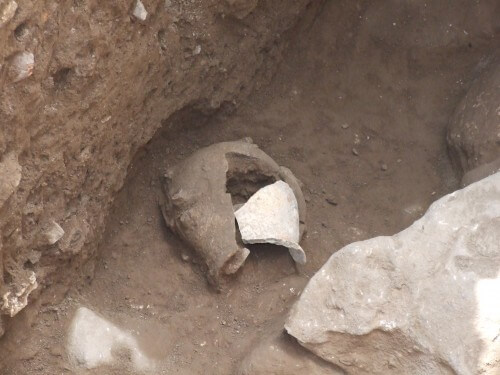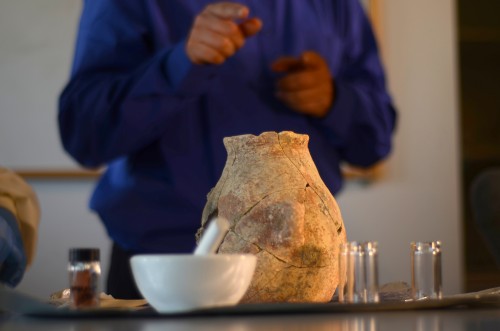According to the dig managers from the Antiquities Authority, "this is the earliest evidence of the use of olive oil in Israel, and possibly in the entire Mediterranean basin."

The earliest evidence of the use of olive oil in Israel, and perhaps in the entire Middle East basin, was discovered at an antiquities site in the Lower Galilee. This is what researchers of the Antiquities Authority write in an article they recently published in the Israel Journal of Plant Sciences.
In the years 2013-2011, Dr. Yanir Milevski and Nimrod Getsov from the Antiquities Authority conducted an archaeological rescue excavation at Ein Tzipori in the Lower Galilee. This, before the expansion of Route 79 by Netibi Israel. This excavation led to research, which indicates the use of olive oil in Israel already 8000 years ago - in the sixth millennium BC.
Getsov and Dr. Milevski systematically sampled the pottery that was found in the excavation, in order to know what was stored in them and what uses were made of them by the ancient inhabitants of the place. Together with Dr. Debori Namdar from the Institute of Earth Sciences at the Hebrew University of Jerusalem, they took a small piece of the pottery, and using chemical methods of extraction and identification, tested the organic remains that were attached to the sides.
From these tests, it emerged that the pottery dating to the early Chalcolithic period contained olive oil.
A comparison of the results of the extraction from the archaeological clays with that of a one-year-old modern oil, showed a great similarity between the two, which teaches about a particularly high level of preservation of the ancient material, which survived in a composition close to the original for about 8000 years. Among the 20 vessels sampled, two were found to be particularly ancient and dated to approximately 5,800 BC.

According to the researchers, "In underwater archaeological excavations conducted by Dr. Ehud Galili off the coast of Kfar Samir south of Haifa, remnants of the olive oil industry from this period were previously found, while now, in Zipori, evidence of the use of olive oil has been found for the first time. Together with the discovery from Kfar Samir, this is the earliest evidence of olive oil production in Israel, and possibly in the entire Levant (Mediterranean basin)" said Milevski and Getsov. "Apparently, olive oil was already part of the diet back then, and maybe it was also used for lighting. Although it is impossible to determine with certainty, it is possible that this is a species of olives that was domesticated and added to the known field crops: grains and legumes. These crops are known for at least two thousand years before the settlement of Ein Tzipori. With the adoption of olive oil, the basis of the ancient Mediterranean food was completed. From then until today, the Mediterranean economy is based on "Yitzhar, Dagan and Tirosh", the three crops that are frequently mentioned in the Bible.

5 תגובות
The word was mentioned by you only.
Joseph
What are you rowing for? It was not Jews who made the olive oil.
The dates of Chinese culture and Greek culture are not confused. At that time they were on the trees.
Leosie,
You are confusing the dates. The Neolithic period began in our area about 12,000 years ago, which means that this find is consistent with what we already know.
This is not the kind of article that attracts chain reactions.
8,000 years is prehistory and the stone age.
This is about 3,500-4,000 years before the first emperor of China who united the kingdoms,
The same about 4000 years before the Mycenaean culture, the first in Greece of tribes from Northern Europe. The culture that preceded the Ionian culture which founded the city-states in Greece.
It requires a transition from nomadic hunter-gatherers to farmers with knowledge of machines to extract the oil. At that time, ancient people roamed all over the world and here they made olive oil.